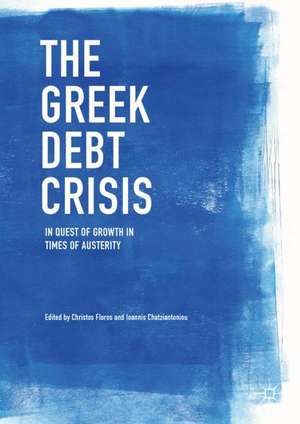The Greek Debt Crisis: In Quest of Growth in Times of Austerity
Editat de Christos Floros, Ioannis Chatziantoniouen Limba Engleză Hardback – 17 noi 2017
This book sheds new light on the Greek economic challenges and helps readers understand the current debt crisis. Chapters from leading experts in the field identify and outline potential solutions to the on-going decline of the Greek economy by considering both Eurozone-adopted current policy framework explanations and potential alternative explanations. In contrast to the standard chronological approach toward the Greek debt crisis typically adopted by other texts, this book draws on the experience and views of specialized economists and offers divergent opinions that could potentially form alternative solutions. It will be of interest to researchers and academics interested in the Greek economy, modern financial modelling, and risk management.
| Toate formatele și edițiile | Preț | Express |
|---|---|---|
| Paperback (1) | 583.16 lei 38-44 zile | |
| Springer International Publishing – 23 aug 2018 | 583.16 lei 38-44 zile | |
| Hardback (1) | 644.95 lei 6-8 săpt. | |
| Springer International Publishing – 17 noi 2017 | 644.95 lei 6-8 săpt. |
Preț: 644.95 lei
Preț vechi: 758.77 lei
-15% Nou
Puncte Express: 967
Preț estimativ în valută:
123.43€ • 128.38$ • 101.90£
123.43€ • 128.38$ • 101.90£
Carte tipărită la comandă
Livrare economică 15-29 aprilie
Preluare comenzi: 021 569.72.76
Specificații
ISBN-13: 9783319591018
ISBN-10: 3319591010
Pagini: 313
Ilustrații: XVI, 313 p. 40 illus.
Dimensiuni: 148 x 210 mm
Greutate: 0.54 kg
Ediția:1st ed. 2017
Editura: Springer International Publishing
Colecția Palgrave Macmillan
Locul publicării:Cham, Switzerland
ISBN-10: 3319591010
Pagini: 313
Ilustrații: XVI, 313 p. 40 illus.
Dimensiuni: 148 x 210 mm
Greutate: 0.54 kg
Ediția:1st ed. 2017
Editura: Springer International Publishing
Colecția Palgrave Macmillan
Locul publicării:Cham, Switzerland
Cuprins
Chapter 1: When did it go wrong? The case of Greek Sovereign Debt.- Chapter 2: Asymmetry, austerity and anxiety: The approach to the Greek debt crisis.- Chapter 3: Debt Supercycle in Greece and Secular Stagnation in the Eurozone: Implications for Policy.- Chapter 4: The effects of the financial crisis on the creditworthiness of banks.- Chapter 5: On the split of social security contributions between funded and pay-as-you-go pension schemes; contribution to growth.- Chapter 6: The role of sovereign CDS Spreads for stock prices: Evidence from the Athens Stock Exchange over a 'default' period.- Chapter 7: History of Greece's Debt Crisis and the banking policy.- Chapter 8: The market reaction on ex-return of capital dates during financially constraint periods.- Chapter 9: The impact of Greek economic news on European financial markets. Evidence from the European sovereign debt crisis.- Chapter 10: Innovation and SMEs financial distress during the crisis period: the Greek Paradigm.
Notă biografică
Christos Floros is a Professor of Finance at the Technological Educational Institute of Crete and at the Hellenic Open University, Greece. His main research interests include behavioural finance, financial derivatives, financial econometrics, and empirical banking. He is the Editor-in-Chief of the International Journal of Financial Markets and Derivatives (IJFMD) and has published in a number of academic journals, including Journal of Empirical Finance, Journal of International Financial Markets Institutions and Money, International Review of Financial Analysis, Economic Modelling, Manchester School, and Global Finance Journal. Christos is a Fellow of the Higher Education Academy, UK, a member of the Economic Chamber of Greece (ECG), and co-author of Modelling and Forecasting High Frequency Financial Data (Palgrave 2015).
Ioannis Chatziantoniou is a Senior Lecturer of Economics and Finance at the Portsmouth Business School, University of Portsmouth, United Kingdom. His main research area is empirical macroeconomics with a particular interest in monetary policy, housing markets, financial markets and energy. His studies have been published in international academic journals such as Economics Letters, Review of Quantitative Finance and Accounting, Energy Economics, and International Review of Financial Analysis. His work has been presented at prominent academic conferences and he has served as a reviewer for academic journals such as the Journal of Banking and Finance, Energy Economics, and Applied Economics. He has written articles about the Greek debt crisis in various media outlets and newspapers, notably in the EUROPP (LSE) blog and The Conversation.
Ioannis Chatziantoniou is a Senior Lecturer of Economics and Finance at the Portsmouth Business School, University of Portsmouth, United Kingdom. His main research area is empirical macroeconomics with a particular interest in monetary policy, housing markets, financial markets and energy. His studies have been published in international academic journals such as Economics Letters, Review of Quantitative Finance and Accounting, Energy Economics, and International Review of Financial Analysis. His work has been presented at prominent academic conferences and he has served as a reviewer for academic journals such as the Journal of Banking and Finance, Energy Economics, and Applied Economics. He has written articles about the Greek debt crisis in various media outlets and newspapers, notably in the EUROPP (LSE) blog and The Conversation.
Textul de pe ultima copertă
This book sheds new light on The Greek economic challenges and helps readers understand the current debt crisis. Chapters from leading experts in the field identify and outline potential solutions to the on-going decline of the Greek economy by considering both Eurozone-adopted current policy framework explanations and potential alternative explanations. In contrast to the standard chronological approach toward the Greek debt crisis typically adopted by other texts, this book draws on the experience and views of specialized economists and offers divergent opinions that could potentially form alternative solutions. It will be of interest to researchers and academics interested in the Greek economy, modern financial modelling, and risk management.
Caracteristici
Focuses on modern financial modelling with an emphasis on the Greek debt crisis Contributions from leading experts in their fields including key decisions makers Draws together divergent perspectives and approaches to identify potential solutions to the ongoing crisis Includes supplementary material: sn.pub/extras
